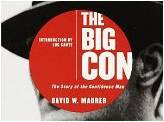I got a "compliment" from a fellow employee yesterday (at least he said it was a compliment). It went something like this: "You are, without a doubt, the world's best con man. I mean, if this were the 1900's, you could run for millions of dollars." I was a bit taken aback by this compliment because, in some way, I'm being compared to a criminal. I asked him what exactly he meant by the comment and he responded that I have a natural way of understanding people and adapting their behavior and style.
It bugged me for a few hours, but then I got to thinking about the characteristics of the world's best con men. In today's society, hearing about a big con going down in your neighborhood isn't that common. One of my hobbies has been to read as much as I can about the old con men in the early part of the 20th century. They fascinate me because of the prevalence of their work in the big city markets. These organized crime syndicates were slick operations. They took people in a variety of ways, but it usually involved some type of financial con, including horse racing, stock trading and others. Millions of dollars were traded in the big con.
In the early 1900's, con men had roles to fill in operating the big con. These confidence men and games exploit typical human weaknesses like greed, dishonesty, vanity, honesty, compassion, credulity and irresponsibility. The common factor is that the mark relies on the good faith of the con artist. When you consider these traits above, they look like the classic "used-car salesman" characteristics. The interesting thing about our profession is that we have a choice when we deal with potential customers (let's not call them a mark, OK?). One choice is to exploit human weaknesses, the other is to be a trusted advisor. There's a fine line between the two and it has been plaguing our profession since time began. Much of the decision comes down to ethics and morality, but one thing is clear: Salespeople can attain greatness (including financial wealth) by choosing the side of good rather than bad.
I guess the compliment by my friend was meant in a positive way, but it's interesting to reflect on how easy it is to abuse the salesperson/customer relationship. This challenge represents one of the most difficult parts of being a great salesperson.
If you're interested in the confidence men of old, I highly recommend David Maurer's book, "The Big Con: The Story of the Confidence Man." Here's a link: http://www.amazon.com/Big-Con-Story-Confidence-Man/dp/0385495382.

You can get a quick and dirty sale by being a bad con artist,but long term you will end up in the grave like most gangsters. Deep down, I think people want to be guided to a decision so finding their desires and how they operate and guiding them to a decision is an ethical way to not only get a sale, but make a friend and advocate.
ReplyDelete